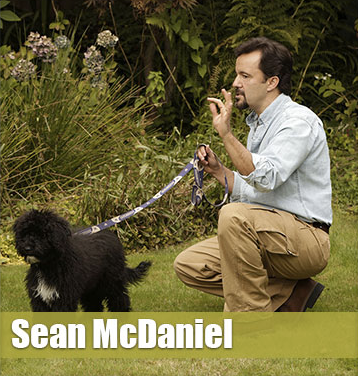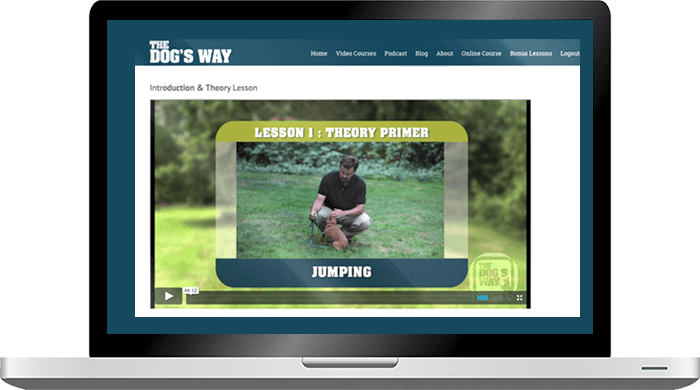Session 18: The Overview of What to Teach a Puppy and When, and Teaching Two Dogs to Not Go After Each Other’s Fetch Toys
In this episode, in the puppy section, I take answer a listeners question about what to teach a puppy and when – sort of a puppy curriculum. In the training section, I give you a step by step plan to teach two dogs to not go after each other’s fetch toy. This solution also applies to two or more dogs competing over food bowls, chew toys, each other’s bed, and deciding when an owner pets another dog.
In this session:
Puppy Section: Puppy Curriculum – what to teach a puppy and when to teach it
Training Section: A step by step process to teach your dogs to not compete over fetching toys (or anything else)
Details In this Section
Puppy Section
PUPPY 101
Stage 1: 8-10 WEEKS (GENERALLY THE FIRST TWO WEEKS AT YOUR PLACE)
Goals:
- Bonding
- Getting used to the safe area
- decompressing from the big move from the breeder to your house
- Housebreaking schedule and consistency (house breaking 101)
Training:
- Teaching the first treat lesson: Introduce your “marker word”. And, If you stop trying to get the treat from my hand, (I’ll use a marker word like “good!”) and then immediately give you the treat.
- Name and following off leash in an enclosed area (the start of luring)
- Introduce the leash: I use a retractable leash for the first couple of weeks. It keeps the leash up out of the way of the puppy and offers a little bit of pressure on the pup’s body that I want them to feel. (later though I want a totally loose leash so I wean off of this retractable leash after about 10 weeks)
- DON’T worry too much about jumping up and climbing on you at this point
- Dissuade biting by replacement with a toy
Stage 2: 10-16 WEEKS
Goals:
- Start exposing your pup to more sights & sounds
- Some limited interaction with other pups and dogs and meeting people. Reward polite interaction body language.
- Begin to introduce some commands.
- Move through house breaking 101 to 201 (read those articles and that will make more sense)
Training:
- Introduce a regular leash
- ‘Follow me’ game on leash
- Sit
- Down
- Come
- Leave it
- With me
- Begin dissuading climbing up and jumping up with body language, luring off of you, and verbally ‘marking’ and rewarding decisions to stay on the ground
- Begin marking and rewarding recovery behavior around distractions
- Introduce meeting and greeting ritual
- Introduce handling exercises
- Learn and use body language consistently with pup for unwanted behavior
- Introduce brushes and clippers and bath time rituals incrementally
- ‘Be brave’ training around objects that startle your pup
- Continue marking and rewarding recovery behavior
PUPPY 201
4 MONTHS THROUGH 7 MONTHS (VACCINATION SCHEDULE SHOULD BE DONE)
Goals:
- Greater exploring and socializing – lots of “field trips” (with controls)
- Meeting other well socialized dogs at play groups and classes
- Meeting lots of new people, kids, other animals
- You’re moving out of the tiny little puppy stage in this phase so we’re beginning to wean off of a total focus on treats and move into a more mature social relationship with your dog
- Remain scheduled with house breaking but you should be seeing consistent “asking” behavior at the door you’ve been conditioning too. Begin separating bathroom and play obedience exercise trips, outside.
Training:
- Focus on taking all your intro exercises through the progression of difficulty
- Focus on lots of new contexts to practice your obedience exercises in
- Introduce a long line to expand your scope of influence over your pup
- Stay: in the sit and the down
- If your functional obedience is getting more solid, feel free to start teaching “tricks”
- Begin working your handling exercises in higher distraction areas
- Practice nail clipping, brushing and bath time with more distraction around
- Practice calling from a distance with a long line and using a very high value treat for this exercise alone.
- Dissuade biting and mouthing with negative feedback with the leash and
TRAINING SECTION
In answer to Karl’s question about his dog’s competing over fetch toys here’s the notes on that process:
- Do the foundational work with a younger puppy first
- Follow the training protocol for basic (from podcast 10) regarding training two or more dogs.
- Dealing with the fetching after you’ve done your foundational work
- Get long lines for each
- Start by having dog 1 on leash and do 4-5 trials of fetch with dog 2 and fetch toy 2.
- Use the leash to discourage dog 1 from going after dog or fetch toy 2
- Distract and encourage dog 1 to stay with you and focus on their fetch toy (but don’t throw it yet)
- Switch dogs: have dog 2 on leash and play fetch with dog 1 and fetch toy 1
- “Rinse and repeat” … until they get the idea that the other dog and the other fetch toy has nothing to do with them.
- Begin to overlap the fetch sessions until you can play fetch simultaneously with both dogs.
Reminder of FREE STUFF
If we use your voicemail in the show, we’ll send you a free video training series! OR if you don’t like free stuff Email your questions to me: sean@thedogsway.com
All the Best,

About the Author: Sean
I’ve been training people and dogs in Seattle for the last decade and a half. My main focus when working with clients every week in one-on-one, private lessons is to help people learn to get their dogs to a functional level so that they can actually enjoy spending time every day with their dog instead of stressing about their dog’s behavior issues.
Affiliate Program
Make money by referring people to the video course!
. . . . .

About Sean
I’ve been training people and dogs in Seattle for the last decade and a half. My main focus when working with clients every week in one-on-one, private lessons is to help people learn to get their dogs to a functional level so that they can actually enjoy spending time every day with their dog instead of stressing about their dog’s behavior issues.
Ask Sean a question!
If we use your question in the show, Sean will send you a coupon code for free access to the online video course!
If you have a question you’d like me to respond to on the show (and you want to hear yourself on a future episode) leave me a voice mail! 1 (844) 364-7929 or email me here.

